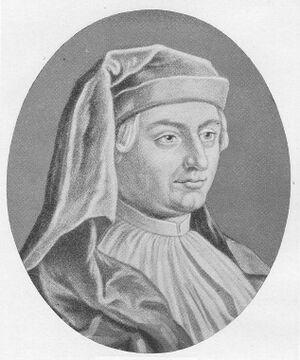رودولفوس أگريكولا
رودولفوس أگريكولا (لاتينية: Rodolphus Agricola "Phrisius"؛ عاش 17 فبراير 1444 – 27 أكتوبر 1485) كان إنسانياً قبل إرازموس من شمال البلدان الواطئة، اشتهر بلاتينيته الجزلة وكان أحد أوائل من أجادوا اللغة اليونانية شمال الألپ. أصبح أگريكولا باحثاً في العبرية في نهاية حياته، ومربياً وموسيقياً وباني أرغن كنائس، وشاعر باللاتينية وكذلك بالدارجة، ودبلوماسي ورجل رياضي، نوعاً ما (ملاكمة). وأكثر ما يشتهر به اليوم هو تأليفه De inventione dialectica، كأبٍ للإنسانية اوروبا الشمالية وكمناهض عتيد للمدرسية في أواخر القرن 15.
. . . . . . . . . . . . . . . . . . . . . . . . . . . . . . . . . . . . . . . . . . . . . . . . . . . . . . . . . . . . . . . . . . . . . . . . . . . . . . . . . . . . . . . . . . . . . . . . . . . . . . . . . . . . . . . . . . . . . . . . . . . . . . . . . . . . . . . . . . . . . . . . . . . . . . . . . . . . . . . . . . . . . . . .
سيرته
وُلِد أگريكولا في بافلو، في مقاطعة Groningen الهولندية، وكان اسمه الأصلي رولوف هوسمان Roelof Huusman.
تلقى رودولفوس أگريكولا، وهو ابن قس هولندي يرعى أبرشية، الكثير من التعليم في إرفورت وكولونيا ولوڤان، ووقف سبع سنوات من عمره على التعليق في دراسات اللاتينية واليونانية في إيطاليا، ثم عاد ليدرس في گروننگن وهايدلبرگ وڤورمس. وتعجب أهل العصر من فضائله غير المألوفة من الجماهير. التواضع والبساطة والأمانة والورع والعفة. وكتب باللغة اللاتينية ما يكاد يكون جديراً بشيشرون، وتنبأ بأن ألمانيا سوف "تبدو يوما وهي لا تقل لاتينية عن اللاتيوم". والحق أن هولندة أگريكولا قد أنجبت في الجيل التالي إرازموس وهو عالم باللغة اللاتينية إلى حد يتيح له أن يحس بأنه في وطنه لو قدر له أن يعيش في روما تاكيتوس وكوينتيليان. وأصيب أجريكولا في رحلة قام بها إلى روما بالحمى التي قضت عليه في هايدلبرگ وهو في الثانية والأربعين من عمره (1485).
الهامش
المصادر
- Agricola, R., from "Three Books Concerning Dialectical Invention." Renaissance Debates on Rhetoric. ed. & trans. W.A. Rebhorn. pp. 42–56. Ithaca, NY: Cornell U P. 2000.
- Gallaudet University Library: - Earliest Known Deaf People: http://library.gallaudet.edu/dr/faq-earliest-deaf.html
- Hamilton, David. "From Dialectic to Didactic." http://faculty.ed.uiuc.edu/westbury/textcol/HAMILTO1.html
- The History Guide - Renaissance Humanism: http://www.historyguide.org/intellect/humanism.html
- New Advent Catholic Encyclopedia - Rudolph Agricola: http://www.newadvent.org/cathen/01231b.htm
- Rodolphus Agricola Phrisius (1444–1485). Proceedings of the International Conference at the University of Groningen 28–30 October 1985, eds. Fokke Akkerman and Arjo Vanderjagt (Leiden: Brill, 1988).
- Wessel Gansfort (1419–1489) and Northern Humanism, eds. Fokke Akkerman, Gerda Huisman, and Arjo Vanderjagt (Leiden: Brill, 1993).
- Rudolf Agricola 1444-1485. Protagonist des nordeuropäischen Humanismus zum 550. Geburtstag, ed. Wilhelm Kühlman (Bern: Peter Lang, 1994).
- Northern Humanism in European Context. From the 'Adwert Academy' to Ubbo Emmius, ed. Fokke Akkerman, Arjo Vanderjagt, and Adrie van der Laan (Leiden: Brill, 1999).
- Agricola's logic and rhetoric are treated in Peter Mack, Renaissance Argument. Valla and Agricola in the Traditions of Rhetoric and Dialectic, (Leiden: Brill, 1993); see also Ann Moss, Renaissance Truth and the Latin Language Turn (Oxford: Oxford University Press, 2003.
- For Agricola's knowledge of Hebrew: A.J. Vanderjagt, 'Wessel Gansfort (1419–1489) and Rudolph Agricola (1443?-1485): Piety and Hebrew', in Frömmigkeit - Theologie - Frömmigkeitstheologie: Contributions to European Church History. Festschrift für Berndt Hamm zum 60. Geburtstag, ed. Gudrun Litz, Heidrun Munzert, and Roland Liebenberg (Leiden: Brill, 2005), pp. 159–172.
للاستزادة
- Gerda H. Huisman, Rudolph Agricola: A Bibliography of Printed Works and Translations, Nieuwkoop: De Graaf, 1985.
- J.R. McNally, "Dux illa Directrixque artium: Rudolph Agricola's Dialectical System," Quarterly Journal of Speech, 52.4 (1966): 337-47.
- J.R. McNally, "Prima pars dialecticae': The Influence of Agricolan Dialectic upon English Accounts of Invention," Renaissance Quarterly 21 (1968): 166-77.
- J.R. McNally, "Rector et dux populi: Italian Humanists and the Relationship between Rhetoric and Logic," Modern Philology 67.2 (1969): 168-76.
- J.R. McNally, "Rudolph Agricola's De inventione dialectica libri tres: A Translation of Selected Chapters," Speech Monographs 34.4 (1967): 393-422.
- Walter J. Ong, S.J., "Ramus: Method and the Decay of Dialogue: From the Art of Discourse to the Art of Reason." (1958) Chicago: University of Chicago Press, 2004.
- Matthew DeCoursey, "Continental European Rhetoricians, 1400-1600, and Their Influence in Renaissance England," British Rhetoricians and Logicians, 1500–1660, First Series, DLB 236, Detroit: Gale, 2001, pp. 309–343.

